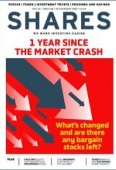Archived article
Please note that tax, investment, pension and ISA rules can change and the information and any views contained in this article may now be inaccurate.
Why we should be fearful of zombies

They may not be too busy just yet but insolvency specialists are feeling fairly confident about their near-term prospects which, on the flipside, is bad news for UK businesses.
On 12 February the recently-listed insolvency and business advisory firm FRP (FRP:AIM) signalled its confidence in the future with plans to pay quarterly dividends while also pointing to a ‘positive’ outlook.
Fellow practitioner Begbies Traynor’s (BEG:AIM) latest quarterly Red Flag Alert Report (covering the three months to 31 December 2020) identified 630,000 businesses in significant distress – a 13% increase quarter-on-quarter and figure described as the ‘tip of a very large iceberg’, with executive chairman Ric Trayor commenting that there are ‘many zombie businesses which have been hanging on by a thread for years before this pandemic’.
In short, based on what they are seeing, both Begbies and FRP reckon the Covid impact has merely been delayed rather than averted by the various support packages brought through by chancellor Rishi Sunak.
Analyst Rachel May at FRP’s house broker Shore Capital said: ‘Whilst it is too early to call whether it is the start of an emerging trend, the latest insolvency statistics for December 2020 reported a 9% increase in company insolvency volumes, marking the first monthly year-on-year increase since the start of the pandemic.’
TURNING JAPANESE
A lot of the affected businesses will be privately-owned small and medium-sized enterprises but there will be listed small caps (and large caps in fairness) which will be under considerable pressure, particularly as state funding is scaled back.
Many otherwise viable businesses have been hit hard by the pandemic and it made sense for the Government to step in and support them.
However, what the UK will be desperate to avoid is a situation where there are lots of zombie companies, i.e. heavily indebted firms being kept afloat by a mixture of bank and state lending which could hamper the economic recovery from the pandemic.
Or in other words Sunak will not want a repeat of the situation in Japan where companies caught out by the bubble bursting in the late 1980s were kept on life support and contributed to a ‘lost decade’ for the Japanese economy in the 1990s.
From an investor perspective it is extremely important to pay close attention to the balance sheets of your holdings of individual stocks, particularly if they operate in a sector which is being heavily impacted by Covid-19.
And in this context the latest and immediately preceding entries in our First Time Investor series should prove very useful as they help with getting to grips with the fundamentals of a balance sheet.
Important information:
These articles are provided by Shares magazine which is published by AJ Bell Media, a part of AJ Bell. Shares is not written by AJ Bell.
Shares is provided for your general information and use and is not a personal recommendation to invest. It is not intended to be relied upon by you in making or not making any investment decisions. The investments referred to in these articles will not be suitable for all investors. If in doubt please seek appropriate independent financial advice.
Investors acting on the information in these articles do so at their own risk and AJ Bell Media and its staff do not accept liability for losses suffered by investors as a result of their investment decisions.

 magazine
magazine








